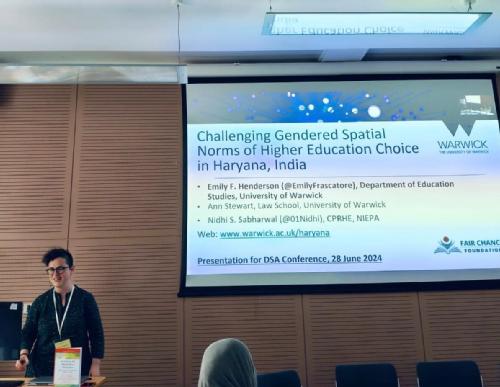News
Dr Henderson presents at the Development Studies Association (DSA) annual conference, June 2024, London.
Dr Henderson recently travelled to London to attend the DSA conference held in June 2024. This annual conference brings together the development studies communities from UK and beyond. Hosted at the School of Oriental and African Studies (SOAS) University of London, this year’s theme was “Social justice and development in a polarising world”.
The talk was titled “Challenging Gendered Spatial Norms of Higher Education Choice in Haryana, India” and was based on the Fair Chance Foundation funded project, “A Fair Chance for Education: Gendered Pathways to Educational Success in Haryana”, which was based at Warwick University 2017-2022.
The talk noted that, in many countries of the world, gender parity of undergraduate enrolment has been achieved. However, there are still deep disparities in the phenomenon of higher education (HE) choice, which refers to the selection of options (institution, qualification, course) following the decision to apply for HE. In North India, HE choice is a spatial phenomenon that operates along binarised gendered lines for young women and men, particularly in rural areas where conservative gender norms are more prevalent and where a history of HE in previous generations is less likely. Families show a clear preference for young women attending the nearest HE college, irrespective of daughters’ academic record or the reputation of the college, in order to protect young women’s honour before marriage. For men, there is a clear preference for sons to attend the best possible college within the family’s means, irrespective of distance. These spatially inscribed gender conservative and patriarchal norms result in gender disparities in HE choice, which in turn affect the benefits young people can access through attending HE.
The project as whole included exploratory research and a programme of activities aiming to bring about positive social change. Dr Henderson’s presentation highlighted the gendered spatial dimensions of HE choice, and how the project developed activities – in particular a programme of college taster days to demystify HE – which contributed to challenging spatial gender norms of HE choice. The presentation also referred to discussions in the book which resulted from the project - "Gendering the Massification Generation - Higher Education Access and Choice in IndiaLink opens in a new window"

